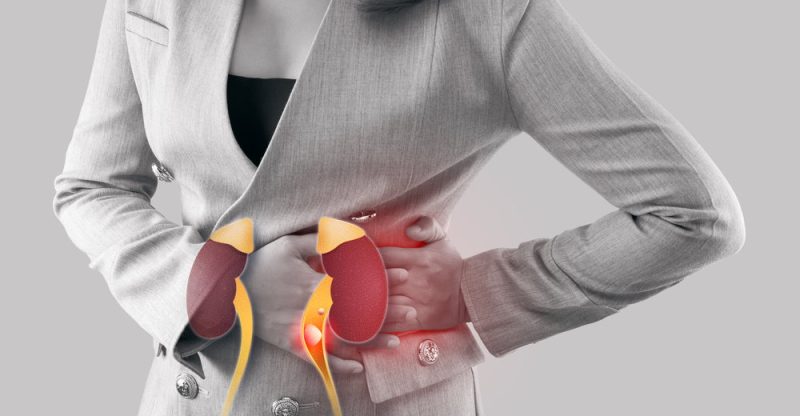14 Causes of Kidney Stone and 5 Natural Treatments
Kidney stones are a common and painful problem. They form when urine builds up in the kidneys, crystallizes into small rock-like objects that become trapped within the urinary tract. The pain can be intense enough to cause nausea and vomiting, fever, sweating, and chills, as well as blood in the urine or stool if they break off inside the kidney collecting vessels.,
Kidney stones are notoriously uncomfortable to pass, so they may easily knock someone out of work, spoil a week, and make it difficult to go about routine tasks. Of course, you want to get rid of your kidney stone symptoms as soon as possible since they’re painful and inconvenient to live with. Still, probably more significantly, untreated kidney stones may often lead to impaired kidney function.
Kidney stones are one of the most frequent urinary tract problems, with over a million patients seeing their physicians in the United States alone each year for treatment with their kidney stones. One out of every ten persons will have a painful kidney stone at some time in their life.
What are kidney “stones” exactly? They’re little, hard deposits that form within your kidneys and are formed of components that are naturally present in your body. They may obstruct normal urine flow, producing discomfort in your bladder as it expands and unusually concentrated urine with minerals that can’t be passed.
While most kidney stones do not cause chronic harm once passed, some do. Untreated kidney stones may lead to kidney damage and, in some circumstances, kidney failure, which is an extremely dangerous and life-threatening disease that necessitates emergency surgery. If you feel you’re suffering from kidney stone symptoms such as discomfort, throbbing, or difficulty going to the toilet, keep reading to learn about some of the finest kidney stone natural cures and how to avoid them in the future.
The Most Common Causes
Kidney stones are formed of clusters of minerals, acids, and salts in the body that binds together within the kidneys, getting trapped and occasionally obstructing the urinary system, causing excruciating pain and pressure when you go to the toilet. Kidney stones occur when your urine has a high concentration of crystal-forming components but not enough of the compounds needed to break up crystals and drain minerals out of the body. This perfect storm creates the optimum conditions for kidney stone production.
Approximately 80% of kidney stones are calcium stones, which occur when calcium that is naturally present in the body interacts with other chemicals (oxalates, phosphate, or carbonate) to produce an excessively hard stone. In most instances, the substance that calcium binds to is oxalates, which we obtain from certain fruits and vegetables that naturally contain them.
While calcium stones are much more prevalent, kidney stones may also be produced by accumulating other acidic salts such as uric acid. Other forms of kidney stones include struvite, uric acid, cystine stones, and calcium stones (the type most tied to hereditary factors).
Why do some people’s bodies accumulate calcium — or other acids? Kidney stones may arise for a variety of causes, including:
- Consuming an unhealthy diet, particularly one heavy in oxalates
- Using calcium supplements that aren’t usually fully absorbed
- Lack of water
- Genetic factors (you’re more prone to have kidney stones if someone in your immediate family gets them often).
- A pH imbalance that causes the body to become too acidic
- having digestive issues, such as recovering from gastric bypass surgery, having inflammatory bowel disease, or having persistent diarrhea
- Food allergies or sensitivities may cause digestive problems.
- Deficiencies in electrolytes
- Obesity
- Usage of medicine or drugs
- Mineral and nutrient deficits
- Infections
- Inactivity
- Thyroid problem (which can cause the thyroid to produce too much parathyroid hormone, which raises calcium levels)
When a kidney stone develops, it may adhere to locations in the urinary system that impede it, which is generally the source of such excruciating pain. In addition, struvite stones (the “horn-shaped” variety, which is bigger than calcium stones and typically more harmful) may occur in certain persons due to recurrent urinary tract infections, which are more prevalent in women than in males.
A buildup of ammonia in the urine is why urinary infections might continue to grow and create stones. In addition, uric acid stones, a result of protein metabolism, may form in persons who consume a high-protein diet, are recuperating from chemotherapy, or in rare instances, due to hereditary causes.
The discomfort may go away, making it seem as if the kidney stone has disintegrated on its own and is no longer an issue – but this isn’t always the case. The blockage hasn’t been cleared in certain circumstances, even if the pain has subsided and the kidney begins to shut down. If left untreated by a doctor, it may result in irreversible renal function loss in a short amount of time. On the other hand, if a kidney stone is left untreated for too long, it might burst, resulting in renal failure.
Are You Suffering From Kidney Stones?
The kidneys are little organs in the center of your back, below your rib cage, that are bean-shaped and fist-sized. They are vital organs for removing waste, excess fluids, and urine from the body. The urinary system, which includes the two ureters, bladder and urethra, is connected to the kidneys.
Amazingly, they filter through the body’s blood supply every day to generate one to two quarts of urine, which is then excreted via the urethra tube.
Symptoms of kidney stones include:
- Intense pain below the kidneys (behind the ribs on your side and back) – discomfort comes and goes, fluctuating in severity and lasting between five and 15 minutes (especially when going to the bathroom)
- Lower back discomfort that extends below the kidneys, into the groin, and between the thighs.
- Urine that is cloudy, red, or smells bad
- Urine discoloration, such as brown or pink hues
- Urge to pee more often than usual, even if there isn’t much urine coming out.
- Nausea and vomiting are symptoms of indigestion (especially when feeling intense pain)
- When the condition becomes worse, you’ll have a fever and chills.
Stones may not hurt until they reach a specific size or begin to move around in your kidneys. Who is most likely to have these symptoms? According to statistics, the following persons are at risk for kidney stones:
- Men (for unknown reasons, men are more likely than women to have kidney stones)
- People in their forties and fifties, particularly those between the ages of 30 and 50.
- White people are more likely than African-Americans to get kidney stones.
- People who are taking drugs that might cause dehydration, such as diuretics.
- Anyone with a history of persistent urinary tract infections, gout, hyperthyroidism, or mineral digestion problems.
- People who are sedentary
Homeopathic Treatments
The majority of individuals pass kidney stones successfully after a few days (although with many discomforts). Still, there are a few techniques to speed up the process and prevent kidney stones from reoccurring. You may just need to take pain medication and drink plenty of water to clear a kidney stone, depending on your circumstances. Surgery may be required in certain cases, such as when stones get stuck in the urinary system or create difficulties.
1. Drink plenty of water
Kidney stones may develop if you don’t drink enough fluids, particularly if you exercise a lot, live in a hot area, consume diuretic drinks, or sweat a lot. In addition, if you eat a high-sodium diet, it’s even more crucial to drink lots of water and other hydrating fluids (such as herbal tea, sparkling water, or fruit-infused water). While your fluid consumption may vary based on your size, food, region, and amount of exercise you do, aim to drink around eight ounces per hour.
2. Consume a nutrient-Rich Diet
You’re more likely to get kidney stone symptoms if you consume a diet lacking in minerals, electrolytes, antioxidants, and a balance of carbohydrates, healthy fats, and suitable protein quantities. A rise in ammonia in the urine may be caused by eating an extremely salty or high-protein diet that exceeds your real protein requirements or accounts for around 30% of your diet.
Focus on fresh meals or ” eating the rainbow ” to keep the body’s pH balanced and avoid too much acidity, focus on fresh meals, or “eating the rainbow.”
The following are some of the best meals for preventing kidney stones:
- Fresh fruits and vegetables – According to several studies, persons who eat a primarily plant-based diet with little dairy and meat had fewer kidney stones than those who consume a lot of processed meat, packaged salt meals, and traditional dairy. Bananas, leafy greens of all types (including fresh-squeezed vegetable juice), sprouted legumes, sprouted grains, fish, and modest quantities of pasture-raised chicken are all fresh foods that encourage good kidney function.
- Berries, olive oil, almonds, avocado, and butternut squash are some of the greatest sources of antioxidant vitamin E, which helps balance oxalates and other toxins in the body while also avoiding mucus membrane damage, lowering the chance of stone formation.
- Foods that are acidic in nature and help balance the body’s pH level, such as lemon or apple cider vinegar, may assist the body clear kidney stones, which may seem paradoxical. Combine a tiny quantity of water or blend raw honey in a smoothie.
- Foods high in magnesium and potassium — Magnesium and potassium-rich foods, such as leafy green vegetables, cruciferous vegetables, melon, bananas, and avocado, may help regulate calcium levels in the body.
- Sprouted grains (as opposed to refined grain products) decrease antinutrient content, allowing nutrients to be more easily digested.
On the other side, the following foods might aggravate kidney stone symptoms:
- Sugary meals – Some data suggests that a high-sugar diet might exacerbate kidney stones. Limit your intake of packaged sugary snacks, sweetened beverages (particularly if they’re carbonated), dairy, and even fruit if your symptoms appear to be getting worse.
- Regular unsprouted grains or refined grains — Because they include significant quantities of antinutrients, such as phytic acid, most grain products (including flour and goods like cereal, bread, rolls, cake, and so on) lead to kidney stones.
- Foods naturally high in oxalic acid — While all fruits and vegetables provide a variety of electrolytes and nutrients, some, such as spinach, rhubarb, tomatoes, collards, eggplant, beets, celery, summer squash, grapefruit/grapefruit juice, sweet potatoes, peanuts, almonds, blueberries, blackberries, strawberries, parsley, and cocoa, can increase oxalate buildup in people who are prone to kidney stones.
- Cold cuts and processed meats – Processed meat causes the body to excrete calcium, which means more calcium is transported to the kidneys, where it may pile up and create stones.
- Zinc foods – According to some studies, those who consume more zinc (from foods like pumpkin seeds, cashews, beef, or spinach) are more likely to develop kidney stones.
- Too much vitamin C – While vitamin C has many advantages, too much of it might aggravate kidney stones. According to research, more than three to four grams of vitamin C per day (such as large amounts in supplement form) may worsen kidney stones by adding to oxalate accumulation.
- Caffeine and alcohol dehydrate the body and are difficult to digest, making kidney stones worse.
3. Exercise regularly
Exercise, particularly weight-bearing activities such as strength training or other bodyweight exercises, is beneficial for increasing bone strength and reducing skeletal demineralization. On the other hand, sedentary behavior may lead bones to release more calcium into the bloodstream, increasing the risk of calcium collecting in the kidneys. Try fitness tricks like walking to work, sitting on a stability ball, and performing squats during commercials while watching TV to get more activity into your day.
4. Hot Compresses and Castor Oil Packs
Castor oil contains anti-inflammatory properties that may help relieve discomfort from kidney stone symptoms such as cramps and muscular spasms in the abdomen. You may purchase a castor oil pack or create your own by soaking a clean towel in pure castor oil, placing it on the kidneys, and letting it soak in.
Similarly, apply a hot compress to the kidneys many times a day to improve blood flow, relax stiff muscles, and aid stone passage. Soak a towel in hot vinegar, such as a 50:50 combination of apple cider vinegar and water, to make this even more effective for dulling pain.
5. Supplements that can aid in the prevention of kidney stones
If you get kidney stone symptoms frequently, many vitamins might help:
- Magnesium: avoids magnesium shortage and electrolyte abnormalities by balancing other minerals in the body. Take 250 milligrams twice a day in the form of a pill or as part of a mineral powder supplement.
- B vitamins: B vitamins help prevent calcium and oxalates from building up in the body. Take a B complex vitamin regularly, preferably one with at least 50 milligrams of vitamin B6.
- Antioxidant supplement or multivitamin with vitamin E: beneficial for decreasing inflammation and calcium and oxalate accumulation. Obtain at least 400 IU of vitamin E every day.
- Cranberry extract lowers the incidence of urinary tract infections while also balancing calcium levels. Twice a day, take 400 milligrams.
- Aloe vera juice/gel helps to prevent mineral crystallization in the urinary system. Take 1/4 cup once a day.
- Essential oils, such as lemon, orange, lime, or helichrysum essential oil, may assist the body in cleansing itself of built-up heavy metals, poisons, and minerals. Internally (by adding two drops of 100 percent pure oil to your water twice a day) or topically (by blending several drops with a carrier oil (such as coconut oil) and rubbing it into the lower belly twice daily). Helichrysum oil should not be consumed and should only be applied to the skin.
Calcium supplements and antacids should be avoided since they might exacerbate the problem. Calcium-rich diets are no longer thought to have a significant role in kidney stone formation, although calcium supplements may be associated with an increased risk. If you’re concerned about your calcium levels, it’s best to acquire calcium naturally through meals (such as raw dairy products, yogurt, kefir, beans, and leafy greens) or talk to your doctor about what you can do.
Last Thoughts
Few illnesses are more frequent than kidney stones, which affect an estimated 10% of the population at some time. Genetics, nutrition, allergies, weight, dehydration, pH levels, and other factors all have a role.
Whatever the cause, there are five basic things you can do to alleviate kidney stone symptoms and cure painful kidney stones: remain hydrated, eat a nutrient-dense diet, exercise regularly, use castor oil packs and hot compresses, and supplement with helpful supplements.
You’ll be able to cure your kidney stone symptoms and prevent future stones from developing if you attempt these five kidney stone remedies.
Frequently Asked Questions
What are the main causes of kidney stones?
A: The main causes of kidney stones are excessive calcium, oxalate, and uric acid. These substances can build up in the kidneys, leading to a condition known as renal colic.
What is the best treatment for kidney stones?
A: The best treatment for kidney stones is seeing your doctor. They will know what the ideal course of action would be, and you can decide if this is something that you can do on your own or not.
Related Tags
- can kidney stones cause kidney failure
- what are the first signs of kidney stones
- kidney stones symptoms
- how to treat kidney stones
- causes of kidney stones
FDA Compliance
The information on this website has not been evaluated by the Food & Drug Administration or any other medical body. We do not aim to diagnose, treat, cure or prevent any illness or disease. Information is shared for educational purposes only. You must consult your doctor before acting on any content on this website, especially if you are pregnant, nursing, taking medication, or have a medical condition.
HOW WOULD YOU RATE THIS ARTICLE?





